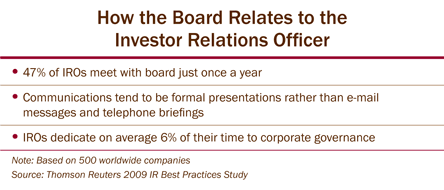|
AGENDA |
|
|
The
week's news from other boardrooms |
|

|
How Boards Get Inside
the Minds of Shareholders
Article
published on
June
7, 2010
By
Kristin Gribben
In an age of intense shareholder activism, boards can run the risk of
getting a skewed view of shareholders’ perspectives on their companies. If
all they hear are the voices of activists, how do they know what the broader
base thinks?
Soliciting the feedback of all investors could cause boards to be more
informed on how well management conveys its strategic plans and provide an
outside view for evaluating the strategy itself.
“It gives [board members] pause and second thoughts that maybe we are headed
in the wrong direction here. At Darden, keeping the board informed has
helped guide strategy,” says Matthew Stroud, vice president
of investor relations for Darden Restaurants.
British Airways has a solution that’s seemingly unique. At the recent
British Airways investor day, held May 21, hundreds of
sell-side analysts and portfolio managers mingled with an unlikely group of
attendees: outside board members. In fact, the board of British Airways has
been attending the annual investor confab for many years.
“Our entire board attends the annual investor day where possible in order to
demonstrate its support for management and to have the opportunity to meet
investors and hear their views firsthand,” says a British Airways
spokeswoman. “We also offer those analysts the opportunity to have
one-to-one sessions with a couple of non-executive directors to discuss
governance as part of the day.”
Over the years, director attendance at annual shareholder meetings has
increased, but involvement in analyst and investor events is still very
rare, experts say, because it’s not seen as the traditional role of a board
to get involved. When board members do talk to investors, it tends to be
with activist union and pension funds that are interested in issues of
corporate governance, over which boards have direct control. Wall Street
investors, on the other hand, are interested in dividend payouts,
price-to-earnings ratios and corporate strategy — all topics the board is
familiar with but usually doesn’t have intimate knowledge of.
But experts say boards should be getting regular information about the views
of their companies from Wall Street and mainstream mutual funds to moderate
the concerns they are hearing from activists, who often represent a small
percentage of a company’s stock ownership.
“It keeps you from veering off one way too much,” said Paul
Washington, Time Warner’s corporate secretary,
during an NYSE-sponsored
webcast earlier this year. “Besides analyst reports, the board listening
in on our earnings calls with analysts, attending investor days if you hold
them — those are great ways to make sure that your board isn’t insulated
from your investors, and you don’t want to do that,” he added.
The most common way for the board to receive information about what
investors are thinking of the company and its strategy is through regular
communication with the investor relations department.
That’s what happens at Darden Restaurants, the operator of popular eateries
like Red Lobster and Olive Garden, where Stroud puts together quarterly
written reports to the board and also gives in-person presentations during
regularly scheduled board meetings.
Such interaction doesn’t always go as far as it does at Darden.
Brinker International, also in the restaurant business, sends the
board quarterly updates on top investors from Thomson Reuters,
but the investor relations officer is not attending regular board meetings,
according to Marie Perry, vice president of investor
relations at the company.
That’s not the best approach, says Lou Thompson, managing
director at consulting firm Kalorama Partners and former
president of the National Investor Relations Institute (NIRI).
“The board of directors needs to hear from the IR person [about whether
analysts and investors] understand the strategy, what do they say about the
company, and so on,” he says.
Oftentimes the CFO, to whom the investor relations officer (IRO) usually
reports, wants to present the investor relations material to the board. That
can sometimes be a mistake, experts say. Ultimately, of course, it’s up to
the board to make sure they are getting the right amount of information from
the right individuals. “It just depends on how active the CFO is,” Stroud
says. “If you have a CFO who is somewhat disengaged from the operations,
then the IRO needs to report to the board on a regular basis.”
One approach some boards will take is to invite a portfolio manager or a
sell-side analyst who covers the company to attend a dinner with the board,
with or without management present, says Keith Mabee, vice
chairman at the communications firm Dix & Eaton.
Thompson says beyond the IRO presenting to the board, the company should
gather data from an outside firm on the opinions of investors and send that
information to the board.
“A number of companies should go out at least every other year and do that
independent measurement,” Thompson says. “[M]any companies do, but not
everyone does.”

|
|
|
An Information Service of
Money-Media,
a Financial Times Company |
|
|
